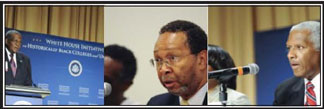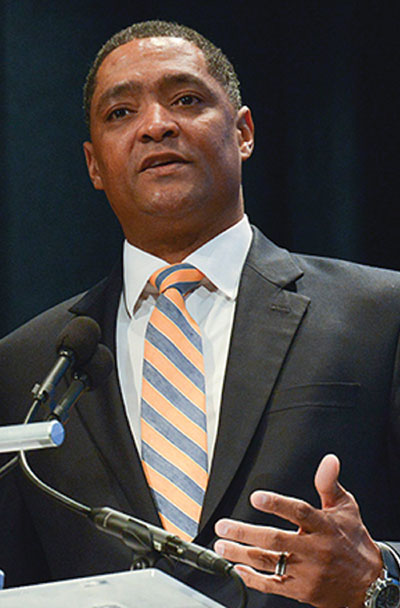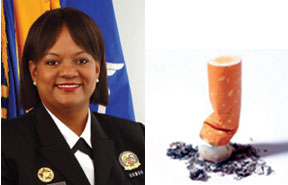

NASA’s Roosevelt Johnson says it is time to believe (NNPA Photo by Freddie Allen).
HBCU William Harvey, dean of the School of Education at North Carolina A&T State university, favors new partnerships.
HBCU George E. Cooper, executive director of the White House Initiative on Historically Black Colleges and Universities says that HBCUs must engage federal agencies.
By Freddie Allen
WASHINGTON, D.C. (NNPA) – As historically Black colleges and universities adapt to the rapidly changing educational landscape, advocates say that collaborative partnerships in business, in the community, and on campus will be needed to ensure that HBCUs survive and thrive in the 21st century.
“My grandfather used to tell me, ‘If someone tells you some-thing three times, you better start believing it,’” said Roosevelt Johnson, deputy associate administrator of education at the National Aeronautics and Space Administration (NASA). “So, I’m going to tell you right now, partnerships, partnerships, partnerships, and you better start believing it.” John-son spoke on a panel titled, “Next Generation Partnerships: Increasing Investment in Inward and Outward Facing Research and Innovation” during the National Historically Black Colleges and Universities Week Conference held in Washington, D.C., a program hosted by the White House Initiative on Historically Black Colleges and Universities during National HBCU Week.
The White House Initiative on Historically Black Colleges and Universities dates back to 1980 when President Jimmy Carter signed executive order 12232 dedicating a federal program to ameliorate the on-going effects of racial discrimination in higher education. Since then, every United States president has expanded the efforts and reach of program. In 2002, President George W. Bush moved the White House Initiative on Historically Black Colleges and Universities to the Department of Education.
In a 2012 proclamation, President Barack Obama touted the role that HBCUs will play in achieving “goal of having the highest proportion of college graduates in the world by 2020.”
HBCU advocates say that will take greater investment in Black schools that have historically trailed their White counterparts in resources ranging from infrastructure to enrollment and endowment.
“We are still dealing with for the most part small liberal arts colleges and you are in competition with very large universities and university systems,” said Johnson in reference to federal and private research grant money.
In order to level the playing field, Johnson suggested that HBCUs collaborate with each other and form coalitions.
Johnson encouraged HBCU administrators to engage with NASA’s Minority University Research and Education Program that works with minority-serving institutions on research programs and increasing diversity in Science, Technology, Engineering and Mathematic fields, commonly known as STEM.
“HBCUs need to understand their own strengths but they just can’t stop there because they are competing against universities who have established relationships more resources and staff members solely focused on creating these partnerships,” said Ivory Toldson, deputy director of White House Initiative on Historically Black Colleges and Universities.
“If you’re at an HBCU, you may be teaching classes, you may be performing research, participating in committees and building relationships at the same time,” said Toldson.
During a panel discussion titled, “Strengthening the Dream Through Intergenerational Leadership,” speakers addressed the need for HBCUs to form stronger relationships with the communities where they reside.
William Harvey, Dean of the School of Education at North Carolina A&T University, touted two public high schools housed on the Greensboro campus of North Carolina A & T as successful ways to form partnerships with the community while exposing students to HBCUs.
The Middle College at North Carolina A&T is an all-male high school on campus that recently made history by achieving a 100 percent graduation rate during the 2011-2012 school year.
Last year, North Carolina A & T opened The STEM Early College.
According to the school’s web page, “Students take honors and Advanced Placement (AP) courses in ninth and 10th grades. Juniors and seniors will take college courses and focus on one of three STEM pathways: biomedical sciences, renewable energy and engineering. Students will graduate with a high school diploma and two years of college credit from N.C. A&T.”
Harvey said that some of their students have already been recognized in the region for achievements in research projects.
Harvey also stressed the need for Black schools to be more proactive in recruiting top-flight students.
“We have to be much more thoughtful and much more intentional,” said Harvey. “We are providing a value proposition to those students and their parents that your son or daughter is going to get something special here that he can’t get at Duke or [the University of North Carolina at Chapel Hill] or Wake Forest.”
Harvey continued: “The flipside of that is that we know that we’re doing more with less. I want to do more with more.”
Harvey encouraged HBCU alumni to think globally and to act locally to find ways to give a percentage of their earnings to their alma maters similar to tithing at church.
When some participants at the conference lamented the lack of support that some young scholars receive from their HBCUs, Greg Carr, associate professor of Africana Studies and chair of Afro-American Studies at Howard University, suggested a different approach.
“You have to ignore Negro leadership at Black schools first of all,” said Carr. “Don’t go looking for the grant first, do the work first and the rest will emerge.”
Carr said that students and faculty need to collaborate in and generate interdisciplinary spaces and take a bottom up approach to their academic and research endeavors.
“Then when you go to the administration, you don’t so much appeal for resources, but demonstrate what has happened,” said Carr. “That’s where we really have the lesson to learn.”
Carr added: “You don’t ask for permission.”
Changes in the federal Parent Loan for Undergraduate Students (PLUS) program sideline many Black students who heavily depend on financial aid to get to college and earn degrees. The changes, which place heavier emphasis on previous loan defaults and foreclosures, disproportionately affected Black families who were hit hard during the housing crisis and economic downturn.
Over the summer, the Department of Education added a loan reconsideration process for students and parents who were previously denied PLUS loans.
Toldson said that the loan reconsideration process, that usually takes less than 10 minutes, has been very successful, enabling students to obtain federal funds who were initially blocked from receiving PLUS loans for college.
“The issue now is not enough students are going through that process,” Toldson said. “It’s a new thing. There’s still a lot of work to be done.”
George Cooper, executive director of the White House Initiative on Historically Black Colleges and Universities, said that the biggest challenge facing HBCUs is finding ways to engage federal agencies to support HBCU initiatives.
“I hope to look at innovative partnerships to build on the strengths of HBCUs,” said Cooper, who is the former president of South Carolina State University in Orangeburg. According to Cooper, HBCUs need to learn how to brag about their unique talents and experiences. “If we form partnerships based on the strengths of our faculty and the strengths of our programs, then it allows us in a creative way to build centers of excellence.”
Some other challenges are fiscal, said Cooper. Falling enrollment, a shaky economic outlook, and accountability on campus are also challenges Cooper hopes to address as executive director of the White House Initiative on Historically Black Colleges and Universities.
Education advocates critized President Obama and the Education Department for the changes in the PLUS loan program that have prevented thousands of Black students from returning to college in recent years, but Cooper said that it’s time for HBCU officials to work closely with the administration to improve conditions for Black college students and Black colleges.
“We can’t change history. What we have to do is move forward,” said Cooper. “As long as our views are heard and we’re involved in the policy decisions with the HBCU community, I think we’ll be fine.”





Be the first to comment